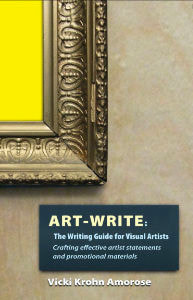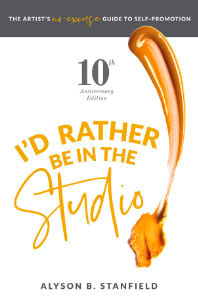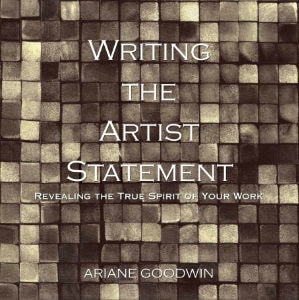- Home
- NEWS
-
PRACTICE
-
MARKETING
- How to write an Artist's Statement >
- How to write an Artist's Resume or CV >
- How to sign a painting, drawing or fine art print
- Business Cards for Artists
- How to write a press release for an artist
- The Private View Invitation
- Publicity for Juried Exhibitions
- Websites for Artists >
- Image & Video sizes for Social Media Sites
- How to be mobile-friendly
-
SELL ART
- FRAME ART
-
SHIP ART
-
COPYRIGHT
-
MONEY & TAX
- About + Help
- BANKING
On this page you will find my summary of the wisdom available online
PLUS a few recommendations of my own
and a few books you might find helpful.
PLUS a few recommendations of my own
and a few books you might find helpful.
In general, an artist statement should address what you make, how you make it, why you make it and your understanding of your work's meaning.
— Claremont Graduate University | Claremont Writing Center | How to write an Artist Statement
OVERALL APPROACH
|
NEED TO KNOW
|
Most art dealers claim that an artist statement is never an important consideration in selecting an artist to show or represent and that a poorly written statement may have a detrimental effect if the artist's slides had otherwise interested the dealer.
Daniel Grant
ART-WRITE: The Writing Guide for Visual Artists
by Vicki Krohn Amorose
by Vicki Krohn Amorose
RECOMMENDED: The top rated book on writing for artists. Rated an average of
- 4.7 out of 5 stars by 83 customer ratings (USA)
- 4.8 out of 5 stars by 109 customer ratings (UK)
For today's artist writing skills are essential to self-promotion, connection and ongoing career opportunity
|
The aim of the book is to teach the reader how to write about art.
Part One covers how to develop and write an Artist Statement. Part Two focuses on other types of writing related to having a career in art e.g.
|
Paperback: 126 pages
Publisher: Vicki Krohn Amorose Date: January 11, 2013 BUY THIS BOOK Art-Write: The Writing Guide for Visual Artists
Art-Write: The Writing Guide for Visual Artists
|
I'd Rather Be in the Studio!: The Artist's No-Excuse Guide to Self-Promotion by Alyson Stanfield
|
This is a book essentially about marketing and equipping an artist to promote their career
It contains one section about how to write an Artist Statement. |
Paperback: 250 pages
Publisher: Pentas Press; Edition: 4th edition Publication Date: April 17, 2019 also available as KINDLE The paperback version (editions 1 and 2 rated an average of 4.7 out of 5 stars by 54 customer reviews Rated an average of
BUY THIS BOOK I'd Rather Be in the Studio!
|
Writing the Artist Statement by Ariane Goodwin
I'm including this book more by way of information than recommendation. It's seven years old and the world has moved on since it was written which, I think, in part accounts for the diverse nature of the reviews it gets.
I'm including this book more by way of information than recommendation. It's seven years old and the world has moved on since it was written which, I think, in part accounts for the diverse nature of the reviews it gets.
|
Bottom line - this books prompts extreme reviews of love or hate.
It's a particular approach to developing an artist statement which may help some people while being seriously annoying others. Early reviews were good - probably because it didn't have much competition. However latterly not so much. Beware - there are some seriously negative reviews of this book on Amazon.com! |
Paperback: 162 pages
Publisher: Infinity Publishing (June 12, 2013) Rated an average of
|
AUDIENCE
|
Write it for the people who you want to buy your art - this is not an academic essay!
|
"Most artist statements, 99 out of 100, are not useful, and they're often ludicrous. A poorly written statement has turned me off an artist's work. |
LANGUAGE
|
REVIEW / REVISE
|
ADVERTISEMENT
|
|
|
More Tips - artist statement articles
|
Artist's Statements - A Critique
|
|
NEXT to:
|
ADVERTISEMENT
|
ABOUT ART BUSINESS INFO. FOR ARTISTS
This website aims to provide a compendium of resources about the art business for artists. Please read "PLEASE NOTE"
It helps artists learn how to do better at being business-like, marketing and selling their art and looking after their financial security.
This website aims to provide a compendium of resources about the art business for artists. Please read "PLEASE NOTE"
It helps artists learn how to do better at being business-like, marketing and selling their art and looking after their financial security.
|
Copyright: 2015-2021 Katherine Tyrrell | Making A Mark Publications
- all rights reserved If you've got any suggestions for what you'd like to see on this website please send me your suggestion
|
PLEASE NOTE:
1) Content and the law change all the time. It's impossible to keep up with it if you're not working on the topic full time. 2) I research topics carefully. However, I am totally unable to warrant that ANY and/or ALL information is
|
3) Hence all information I provide comes without any LIABILITY whatsoever to you for any choices you make.
4) This website is FREE FOR YOU but not for me. Links to books are Amazon Affiliate links. Buying a book via this website means I get a very small payment which helps to fund and maintain this website. .I much appreciate any support your provide. Adverts are provided by Google AdSense - but the adverts do not mean I endorse the advertiser. |
- Home
- NEWS
-
PRACTICE
-
MARKETING
- How to write an Artist's Statement >
- How to write an Artist's Resume or CV >
- How to sign a painting, drawing or fine art print
- Business Cards for Artists
- How to write a press release for an artist
- The Private View Invitation
- Publicity for Juried Exhibitions
- Websites for Artists >
- Image & Video sizes for Social Media Sites
- How to be mobile-friendly
-
SELL ART
- FRAME ART
-
SHIP ART
-
COPYRIGHT
-
MONEY & TAX
- About + Help
- BANKING


